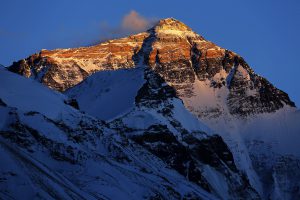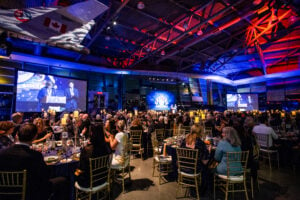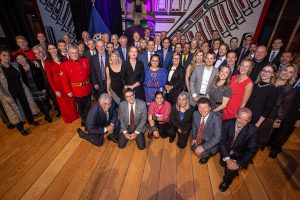
People & Culture
Eight awesome things that happened at the 2018 RCGS Fellows Dinner
Remembering Louie Kamookak, a new Explorer-in-Residence and other highlights from the 89th Annual College of Fellows Dinner
- 1633 words
- 7 minutes
This article is over 5 years old and may contain outdated information.
Exploration

He is the first Canadian to have climbed Mount Everest without oxygen. He’s rowed solo across the North Atlantic, from Canada to France. He’s climbed Canada’s highest mountain, Mount Logan — and the highest peaks in 18 other countries. And as of a couple of weeks ago, Laval St. Germain has another exploration milestone to add to his impressive resume: the Seven Summits.
On Dec. 31, 2018, under sunny skies and with temperatures hovering around -32 Celsius, St. Germain reached the top of Antarctica’s Mount Vinson. In so doing, the Fellow of The Royal Canadian Geographical Society joins an elite list of mountaineers who have summited the highest peak on every continent. Yet reflecting on the climb back home in Calgary, St. Germain is subdued. Summiting Vinson was just one goal of his Antarctic expedition; he opted to abandon the other — a solo ski to the South Pole — due to a problem with his sled.
“It’s bittersweet,” he says of the overall experience, “but to finish the Seven Summits is cool because it was a long time in the making. I’m incredibly fortunate to have the ability to go to these places.”
The expedition raised nearly $30,000 for the Alberta Cancer Foundation — the second time St. Germain has used his extraordinary journeys as a platform to raise money for cancer research and patient support. In 2016, as he was preparing for his solo North Atlantic row, a close friend was diagnosed with lung cancer, so St. Germain decided to help the best way he knew how. His “Confront Cancer Ocean Row” raised $60,000 for the charity.
For his next feat, St. Germain is thinking about switching gears and completing a desert crossing by fatbike (he’s keeping the exact desert under wraps for now, as he believes his expedition will be a world first). In the meantime, he’s looking forward to doing some backcountry ski touring in the Alberta Rockies with his son Eric, 17. Canadian Geographic caught up with St. Germain about his training regimen, healing from tragedy, and what drives him to explore.
On what drives him to explore
I love the outdoors, and I love that mountaineering or even rowing across an ocean are actually very simple goals. You just want to climb to the top of the peak and see that view on the other side. They’re simple goals that are difficult to achieve! I love the logistics, I love the physical training, I love pushing my body as hard as I can, and if I’m climbing in the Zagros Mountains of Iraq and I see a herd of ibex go trotting by outside my tent it’s just like winning the lottery.
On his training regimen
I train all the time. I either run, cycle, backcountry ski or go to the gym. The day after I got back to Chile from Antarctica, I tracked down a gym in Punta Arenas and was working out again. It’s not just the endurance aspect of expeditions; you have to have the fitness to throw a 60-kilogram pack on your back. You have to set up an anchor system and be prepared to haul your buddy out of a crevasse if they fall in. I mix in a bunch of different disciplines and it gives you the physique you need to do these things. Mentally, I borrow a lot from my training as an airline pilot. I’m very procedural, and if I set out a method of doing something that’s optimized for safety I will not cut corners. I don’t want my family to have to live with those questions, you know — “Why did Dad not double-check his harness or make sure that anchor was set properly?”
On exploration as a way of healing after loss
Four years ago, we lost our son Richard. He was 21. He was a bush pilot, just starting out in Norman Wells up in the Northwest Territories, and he drowned while canoeing on the Mackenzie River. So the outdoors has given me everything, but it has also taken away, and the fact that we lost our boy doing something that we used to do as a family was especially painful. But my wife Janet and I decided that we were not going to let this ultimate tragedy wipe out the entire family, so the summer after Richard died, my youngest son Eric and I canoed from Great Bear Lake down the Great Bear River and into the Mackenzie. Along the way I talked to the local Dene people about how they deal with death, and I used that time as a kind of therapy. You don’t ever recover from something like this, but I think we’re as strong or stronger as a family because of what we’ve been through.
On his favourite place
That is tough. I think that’s like picking a favorite child! I can tell you that sleeping in a cave high on Kilimanjaro and watching thunderstorms drifting across the plains of Africa is pretty spectacular. But at the same time, standing outside my tent on Ellesmere Island with a herd of muskox grazing right there is also incredibly special. Every corner of the planet has something to offer when it comes to spectacular scenery and wildlife and sunsets and sunrises and the people that live there, so I can’t pick one. I’m in love with all of them.
On how he hopes to inspire others
I really want to demonstrate to Canadians that through hard work, staying fit, exercising and getting out in the outdoors you can pull these things off. I’m a regular Calgary dad and I think it’s important for people to see that you don’t have to ski in Iraq, you don’t have to row the ocean, you don’t have to climb Everest without oxygen, but you can set goals for yourself and achieve them.
Are you passionate about Canadian geography?
You can support Canadian Geographic in 3 ways:

People & Culture
Remembering Louie Kamookak, a new Explorer-in-Residence and other highlights from the 89th Annual College of Fellows Dinner

Exploration
A century after a Canadian was instrumental in charting the world's highest peak, a fellow Canadian reflects on the magnetism of Everest

People & Culture
Celebrating iconic collaborations, exciting partnerships, a new RCGS president and many more memorable moments from the 93rd College of Fellows Annual Dinner

People & Culture
The Royal Canadian Geographical Society’s 2019 College of Fellows Annual Dinner was also a celebration of the organization’s achievements over the past nine decades — and of the best in geography and exploration